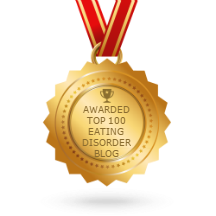- Home
- About
-
Services
- Therapy
-
Eating Disorder Trainings
>
- Clinical Approaches To Treating Body Image Issues
- Clinical Approaches To Treating Bulimia & Binge Eating Disorder
- Finding Freedom From Binge Eating
- Finding Freedom From Anorexia
- Supporting A Loved One With An Eating Disorder
- Eating Disorder Recovery Road Map
- Healing From Body Hate And Practicing Self-Compassion
- Common Questions
- Blog
- Press
- Contact
|
Welcome to my new blog series, "Recovery Stories," where I will share interviews with people who identify as strongly in recovery or fully recovered. I hope that this inspires hope for those who are still struggling with an eating disorder. Jennifer: Tell me a little bit about your struggle with an eating disorder (please avoid numbers of graphic descriptions of behaviors, so as not to trigger my readers): Pepper: The development of the eating disorder was a perfect storm. I was genetically and environmentally predisposed, I had a family history of mental illness and addiction. On my Dad’s side of the family I had aunts, half-sisters and cousins with eating disorders and on my Mom’s side other mental illnesses and addictions. I had a personality temperament that made me anxious, perfectionistic, persistent and emotionally sensitive. I developed mononucleosis when I was 12 years old and I was sick for many months. I also began puberty at this age and did not like the body parts I acquired as I received unwanted attention from a male cousin and as a result I rejected my body. I began not feeling good enough in all areas of my life, I hated myself, I felt depressed and emotionally raw. My peers would make comments about my body and scrutinize what I ate. In an attempt to be healthy, I started eating less and discovered that it numbed my emotions. I suffered in silence for five years, until I hit a breaking point and I wrote a letter to my doctor explaining my mental anguish and body distortions. This led to an eating disorder diagnosis when I was 17 years old. A few months after I was diagnosed my Dad was diagnosed with cancer and I spiraled out of control. I went to five treatment centers in four years and became fully recovered in 2010. Jennifer: What do you think was the function of your eating disorder in your life? Pepper: As a teenager I was confused about my sense of identity, I was afraid to be myself, I didn’t know who that was and I was afraid people wouldn’t like me. I was a highly sensitive, I took rejections from boys I liked, personally and thought there was something wrong with me. The eating disorder helped me numb the inadequacy and raw emotions that I felt. Jennifer: Was there a turning point for you, where you really started to embrace the idea of recovery? Pepper: My Dad was dying from cancer and he was doing everything he possibly could do to live. Although, I never chose to have an eating disorder just like my Dad never chose to have cancer, I could make a choice to be an active participant in my recovery. I decided to throw my hands up in the air and commit 100% to letting go of the eating disorder forever. Jennifer: What were some of your motivations in terms of pushing yourself in recovery? Pepper: I knew that there was a better life out there for me, I was unwilling to settle that I would have an eating disorder for the rest of my life like my family members. I wanted to have a career, get married and have kids and I knew that those things would not be enjoyable or possible if I kept the eating disorder. Jennifer: What was the most helpful for you in terms of your recovery (i.e. specific skills, tools, treatment etc)? Pepper: Journaling – writing down my thoughts and feelings was freeing, it was a way to get the eating disorder thoughts out of my head and to quiet the eating disorder voice. Collaging – I would create vision boards of goals and how I wanted my life to be, looking back many of these vision boards came true. Affirmations – I would write affirmations such as "my worth is not my weight," and “I am enough” and place them all over my bedroom walls and on my mirror, I looked at them every day, they helped rewire my brain. Putting full faith in others and treatment team – I knew I couldn’t see or think clearly and I needed to trust others to see for me until one day in the future when I could see clearly again. Jennifer: If you could go back and talk to your younger self who was really struggling, what would you want to say to her? You are not alone. Just because you can’t see the light at the end of the tunnel and recovery feels impossible, if you keep fighting and never give up, one day you will be fully recovered. All of the hard work you are putting into recovery will be worth it. Pepper: How is your life in recovery (or recovered) different from your life in an eating disorder? What would you say are some of the benefits of being recovered? I have been fully recovered for 8 years meaning I have not had an Ed thought or used a behavior to cope with life for 8 years. I can see myself clearly, having an eating disorder is a thing of the past and nothing could trigger me back into it. I know that I am a worthy person who is good enough. I have a solid sense of my identity and who I am. People’s opinions of me do not influence the thoughts I have about myself. I never thought is a million years that I could ever recover from an eating disorder. Let alone work in the field and now help and inspire people that they too can be fully recovered. I do not regret having had an eating disorder, if anything I am grateful because I have had incredible opportunities to help others, I know that this is what I was meant to do, this is my life purpose. Jennifer: What are some of your favorite recovery resources? (i.e. books, articles, podcasts, etc). Pepper: “Life without Ed” and “Goodbye Ed, Hello Me” by Jenni Schaefer – These books were instrumental in my recovery. Stay posted for the next installation of the "Recovery Stories" series. Feel free to comment some of your favorite recovery mantras or affirmations below. Jennifer Rollin, MSW, LCSW-C: is an eating disorder therapist in private practice in Rockville, Maryland. Jennifer specializes in helping teens and adults struggling with anorexia, binge eating disorder, and bulimia, and body image issues. Jennifer provides eating disorder therapy in Rockville, MD, easily accessible to individuals in Potomac, North Potomac, Bethesda, Olney, Germantown, and Washington D.C. Connect with Jennifer through her website: www.jenniferrollin.com Jennifer also offers online trainings for professionals on eating disorders and body image issues.
1 Comment
Brené Brown a prominent shame researcher talks about how she believes that guilt and shame are fundamentally different. Boiled down to the simplest explanation, Brown explains that guilt is,"I did something bad," whereas shame is “I am bad.” "I define shame as the intensely painful feeling or experience of believing that we are flawed and therefore unworthy of love and belonging – something we’ve experienced, done, or failed to do, makes us unworthy of connection," Brown says. As an eating disorder therapist in private practice, I have noticed that many of my clients initially struggle with feelings of shame around struggling with an eating disorder, or surrounding their eating disorder behaviors. This is perfectly understandable given that there are so many myths about eating disorders swirling around. So just to dispel a few myths:
Eating disorders and Shame When my clients come into my office and judge themselves for having a setback on the path to recovery-or even simply for struggling with an eating disorder symptom-I try to point it out in that moment. A couple times I have said, “how many clients do you think that I would help if I said, (and then I will repeat what the clients just said about their behavior ie "It’s so stupid that you had anxiety about eating that," or "You’re such a failure because you used an eating disorder behavior." The client generally laughs or looks surprised and says “Yea that wouldn't help people.” Then, I will say (with compassion) “so what makes you think that is a helpful thing to say to yourself?” Shaming yourself is never going to be helpful when you are in recovery from an eating disorder (or in general). In fact, shame often perpetuates the cycle. For instance, if a client binges and purges and then shames themselves for the behavior-they may then restrict food the next day-leading them to be far more likely to binge and purge again. Feelings of shame surrounding their eating disorder, may cause the individual to turn to their eating disorder behaviors as a way to cope. Many of my clients have mentioned that they didn’t even realize how much they were shaming themselves, until I pointed it out. Self-Compassion I work to help clients move towards viewing and treating themselves through a more self-compassionate lense Instead of saying, "What the hell is wrong with me, that I’m so anxious about eating this food?" I would have them practice telling themselves, "I’m recovery from an eating disorder. It’s perfectly understandable that I’m feeling really afraid, and I still need to work to challenge myself by gradually facing the foods I am afraid of. Brown shares, "Shame needs three things to grow exponentially in our lives: secrecy, silence, and judgment.” It's important to acknowledge that your eating disorder has served a function in your life. It may have even helped you to get through some difficult or traumatic circumstances, and it also is no longer serving you. Through acknowledging this, we can start to uncover the function of your eating disorder and work towards finding new coping strategies that are more in alignment with your true values. If you are struggling with feelings of shame in your recovery journey, it’s so important to practice being open and honest with people that you trust. If you find that members of your treatment team are shaming you-I’d advise letting them know, and if it persists to find a new team. With self-compassion and through the use of tools and skills-you can work to find freedom from your eating disorder. I feel so privileged to be able to work almost exclusively with people with eating disorders. They are some of the most intelligent, kind, resilient, and strong people, that I know. Jennifer Rollin, MSW, LCSW-C: is an eating disorder therapist in private practice in Rockville, Maryland. Jennifer specializes in helping teens and adults struggling with anorexia, binge eating disorder, and bulimia, and body image issues. Jennifer provides eating disorder therapy in Rockville, MD, easily accessible to individuals in Potomac, North Potomac, Bethesda, Olney, Germantown, and Washington D.C. Connect with Jennifer through her website: www.jenniferrollin.com |
About MeI'm an eating disorder therapist in private practice in Rockville, MD. Archives
June 2024
|



 RSS Feed
RSS Feed
